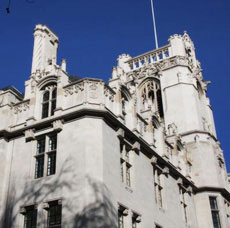Three-day appeal in the case of MM (Lebanon) and Others begins in the Supreme Court
The Supreme Court is today set to hear the appeal in the case of MM (Lebanon) and Others on whether the introduction into the Immigration Rules of a minimum income requirement for a UK citizen or resident wishing to bring a non-EEA spouse or partner into the UK is in breach of Article 8 of the ECHR, unlawfully discriminatory and/or irrational.
 Under the requirement, those wishing to bring a non-EEA spouse or partner into the UK must earn over £18,600. This increases to £22,400 if they have a non-British child, and each subsequent child adds an additional £2,400 to the earnings threshold.
Under the requirement, those wishing to bring a non-EEA spouse or partner into the UK must earn over £18,600. This increases to £22,400 if they have a non-British child, and each subsequent child adds an additional £2,400 to the earnings threshold.
The case of MM and Others first came before the High Court in 2013, when Justice Blake concluded that while the Immigration Rules were not unlawful, the earnings threshold would amount to a disproportionate interference with family life if combined with one of the four other requirements in the Immigration Rules.
In July 2014, the Court of Appeal allowed the Secretary of State's appeal against that judgment and found that the £18,600 minimum income requirement for partner visas was justified (43 Temple Row Chambers has a useful legal summary here).
As the Guardian reported yesterday, the families of UK citizens denied the right to live in Britain because of the requirement will now challenge the rules in the Supreme Court.
The hearing is set to last 3 days.
According to the Guardian, campaigners estimate 43% of the UK population does not earn enough to cross the earnings threshold. Recent research found some 15,000 British children are either separated from one parent or forced to grow up outside the UK because of the rules.
The Home Office justifies the rules as a means of ensuring that family life is not established in the UK at the taxpayer's expense.
Migrants' Rights Network and the BritCits campaign group, which was formed as a direct response against the minimum income requirement, last week published an in-depth briefing ahead of this week's Supreme Court hearing here.
According to the briefing, the families appealing against the earnings threshold hope that the Supreme Court will rule that less intrusive measures would be more appropriate to show that the maintenance requirement can be met.
Don Flynn of the Migrants' Rights Network told the Guardian: "In any case I have ever been involved with, the Home Office has not once exercised any discretion. You have to earn over that amount or it will be refused. I would hope the Supreme Court will acknowledge that, perhaps draw up some guidelines for when that discretion should be exercised in order to make sure the right to a family life is protected."
The case will be heard by Lady Hale, Lord Kerr, Lord Wilson, Lord Reed, Lord Carnwath, Lord Hughes and Lord Hodge.